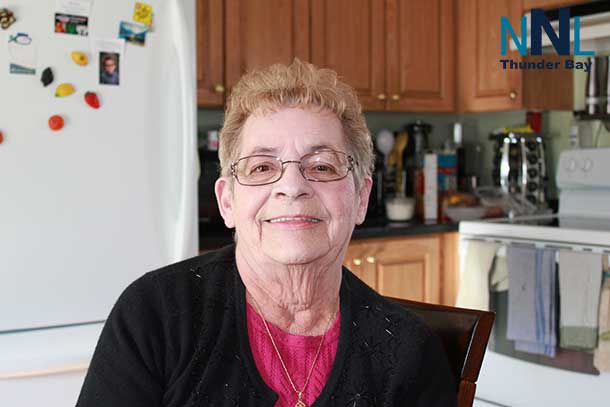

THUNDER BAY – HEALTH – Sometimes, all it takes is one story to save a life. This is what Rita Leclarc hopes for as she shares her cancer story – to help save one person from getting colorectal cancer.
Rita spent the majority of her life in Keewatin, Ontario (a neighbourhood of Kenora). She worked at Lake of the Woods Hospital as a nurse aide until she retired. Having a strong family history of cancer and having been a healthcare provider, she was very aware of how cancer can impact one’s life; then it happened to her.
In 2004, Rita noticed blood in her stool. Luckily, she already had a doctor’s appointment scheduled, so she told her doctor about her symptoms. “I’ll never forget the experience. It all happened so suddenly. My doctor called for me to see a specialist immediately. Soon after, I had surgery in Winnipeg where my entire bowel was removed,” recalls Rita. “After the surgery, life was a big adjustment.” While Rita didn’t require chemotherapy or radiation treatments for this bout with cancer, she had to alter her diet and would now require a permanent colostomy bag.
In the following years, she moved to Thunder Bay to live with her son. This is where she found out that her health challenges would continue when a spot on her lung was revealed in a CT scan.
In 2008 and 2009 she underwent lung operations to remove cancer. She also went through chemotherapy, radiation treatments and even two rounds of clinical trials to treat her cancer.
When it comes to sharing her story, Rita says, “Most people don’t like to see their doctor to get tested, but it’s for your own good. A lot of people don’t realize that they should be checked [for cancer] because they feel good, but you need to do it.”
After Rita’s initial diagnosis, colorectal cancer screening became a priority for her and her family. Rita’s sister arranged to be screened immediately. During her colonoscopy, doctors found cancerous cells and she required an additional surgery. Now, Rita’s children are also being screened for colorectal cancer regularly.
Rita is a cancer screening advocate. While she has been through many challenges, she hopes that her story can prevent someone else from having to do the same. “Based on what I have been through, I want everybody to know that it is so important to take care of your health. I hope that I can help to save one person.”
When caught early through regular screening, there is a 90 percent chance that colorectal cancer can be cured. Men and women, ages 50 to 74 years, should be screened for colorectal cancer every 2 years (if they have no family history) with a ColonCancerCheck Fecal Occult Blood Test (FOBT) kit. You can get this kit from your healthcare provider or by calling Telehealth Ontario at 1-866-797-0000. Women, ages 50 to 74 years, can also get their FOBT kit on the Screen for Life Coach by calling to book an appointment at: 1-800-461-7031. For more information, visit: www.coloncancercheck.ca.






